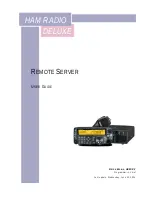
Chapter 6: BIOS
95
ACPI Settings
Use this feature to configure Advanced Configuration and Power Interface (ACPI) power
management settings for your system.
NUMA Support (Available when the OS supports this feature)
Select Enabled to enable Non-Uniform Memory Access support to enhance system perfor-
mance. The options are
Enabled
and Disabled.
WHEA Support
Select Enabled to support the Windows Hardware Error Architecture (WHEA) platform and
provide a common infrastructure for the system to handle hardware errors within the Windows
OS environment to reduce system crashes and to enhance system recovery and health
monitoring. The options are
Enabled
and Disabled.
High Precision Timer
Select Enabled to activate the High Precision Event Timer (HPET) that produces periodic
interrupts at a much higher frequency than a Real-time Clock (RTC) does in synchronizing
multimedia streams, providing smooth playback and reducing the dependency on other
timestamp calculation devices, such as an x86 RDTSC Instruction embedded in the CPU.
The High Performance Event Timer is used to replace the 8254 Programmable Interval Timer.
The options are
Enabled
and Disabled.
Trusted Computing (Available when a TPM device is detected
and PTT Support under "Server ME Config" is not Enabled)
When a TPM (Trusted-Platform Module) device is detected in your machine, the following
information will display.
•
TPM2.0 Device Found
•
Vendor
•
Firmware Version
Security Device Support
If this feature and the TPM jumper (JPT1) are both enabled, the onboard security (TPM) device
will be enabled in the BIOS to enhance data integrity and system security. Please note that
the OS will not show the security device. Neither TCG EFI protocol nor INT1A interaction
will be available for use. If you have made changes on the setting on this item, be sure to
reboot the system for the change to take effect. The options are Disable and
Enable
. If this
option is set to Enable, the following screen and items will display:
















































